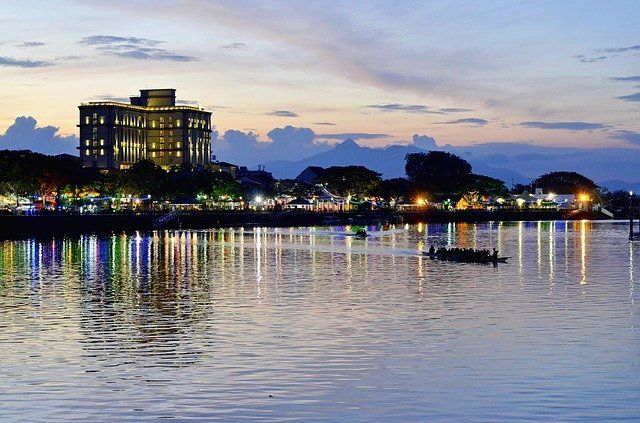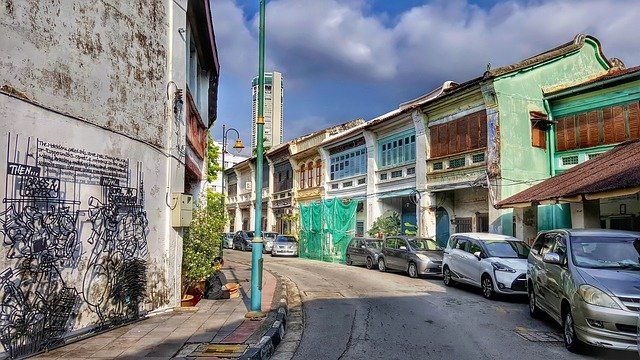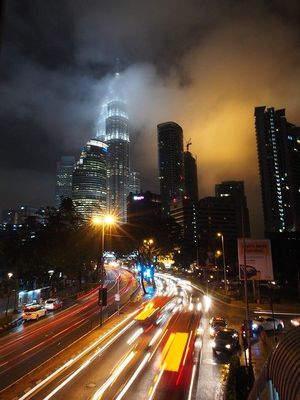Malaysia is a young nation, still struggling to establish itself politically, economically and socially. Over half its population is Malay, while Chinese account for a quarter. Religion is divided along ethnic lines: Malays are Muslims; Chinese are followers of an amalgam of Confucianism, Taoism and Buddhism, and Indians are Hindu. The indigenous communities in Sarawak and Sabah are nominally Christian, while those in Peninsular Malaysia are animist.
Church history
Islam was brought to South East Asia, at the end of the thirteenth century A. D. by Arab and Indian traders. It replaced the Hinduism of earlier centuries. Roman Catholicism was introduced when the Portuguese arrived in the sixteenth century. The Dutch and then the British followed. The Protestant missionary, Robert Morrison, visited Melaka (Malacca) to translate the Bible into Chinese.
Many existing Protestant churches, including Methodist, Presbyterian and Baptist, started amongst Chinese immigrants, who came to Malaya when the British brought in Chinese labourers to work in the tin mines. Indians came from southern India to work in the rubber plantations.
To this day, Baptists are concentrated in the northern half of the peninsula, while Presbyterians are mainly in the southern half. People of the Fuchow dialect brought Methodism to Malaya and Borneo. The Chinese evangelist, John Sung (1901-44), made a number of trips to Malaya, which resulted in revival in the Chinese community. Missionaries from various mission societies also established independent churches.

During the rule in Sarawak of the ‘White Rajahs’ (James and Charles Brooke), missionaries worked in north Borneo. Today Lutherans and Anglicans (and Roman Catholics) are concentrated in Sabah, while Anglicans and Methodists (as well as Seventh-day Adventists and Roman Catholics) are found in Sarawak.
The Borneo Evangelical Mission (BEM) began its work in northern Sarawak in the 1930s, and the Lun Bawangs were the first tribe to turn to Christ. Work continued among the hill tribes (Orang Ulu). The church founded in Borneo was named the ‘Sidang Injil Borneo’ (SIB). Revival came to the Kelabits in Bario in 1973. Today, the SIB is dominated by the Orang Ulu, although it has Chinese and others in its fold too. Meanwhile, the government closed the door to foreign missionaries in Malaysia during the 1960s, and took over the mission schools.
The churches today
The overall situation is not good. Armini-anism is rife in the evangelical churches. There is ignorance of the doctrines of grace and, in some cases, outright opposition. Many churches are distracted from gospel work by their involvement in social projects. The charismatic movement has ravaged most of the English-speaking and almost all of the Tamil-speaking churches. A few General Baptist and Evangelical Free churches stand apart from the charismatic movement, while the majority in these groups have accommodated to it. Many of the Brethren churches have not embraced charismatic doctrine either.
The ecumenical movement has gained in strength. It is led by three major groupings — the Roman Catholic Church, the NECF (National Evangelical Christian Fellowship), which is supposed to represent independent churches, and the CCM (Council of Churches in Malaysia, representing mainline Protestant denominations, particularly Anglicans, Methodists and Presbyterians). Most of these groups are active in ‘evangelism’, but they operate from a very weak doctrinal base, where pragmatism holds sway. The proportion of Christians in Malaysia has been quoted as being as high as 10% of the population, when, in reality, the regenerate cannot amount to more than 2%.
Bible Presbyterians, based in Singapore, have maintained a strong spirit of mission and separation from doctrinal error. They have planted a number of churches in Malaysia. Espousing Calvinism, they nevertheless seem to have difficulty with the biblical doctrine of particular redemption.

Theological training
The General Baptists possess a theological seminary in Penang, while the Anglicans, Methodists and Evangelical Lutherans (who are theologically liberal) jointly run a seminary in Seremban. The Malaysia Bible Seminary, currently based in Klang, is interdenominational. The Assemblies of God have their own seminary. There are seminaries and Bible schools in Sabah and Sarawak. Some Malaysians have received theological training in Singapore, while others trained in USA, UK, Australia or New Zealand. Some preachers and seminary lecturers trained in Reformed seminaries overseas do not have a clear grasp of Reformed doctrine and its practical implications.
East Malaysia
In East Malaysia, the situation is no better. Many Anglicans have embraced charismatic teaching, including that associated with the ‘Toronto Blessing’. Nominalism is rife amongst the Chinese Methodists and indigenous people. The SIB was beset with weaknesses from the beginning. Being an inter-denominational mission, BEM missionaries were unable to provide clear teaching on the form of government to be adopted when churches were first constituted. Furthermore, pastors were encouraged to enter politics when Sarawak and Sabah joined the states in the Peninsula to form Malaysia in 1963. Today, the SIB is severely weakened by charismatic teaching, first sown by some of the early missionaries. The group that appears to have most spiritual life in this region is based on Chinese-speaking Gospel Chapels in Miri, Sarawak.
Reformed Baptists
Reformed Baptist churches began to be formed in Malaysia in 1982. Currently eleven congregations are scattered throughout the country. These are relatively new churches, and half of them do not have pastors. They maintain close fellowship with two Reformed Baptist congregations in Singapore, which are the fruits of the earlier labours of a pastor from New Zealand. The Reformed Baptists have an annual ministers’ conference, which attracts about forty men from Malaysia and Singapore. Others have attended from Indonesia, Myanmar, Sri Lanka, Philippines, India, Nepal and Australia. The Reformed Baptists publish Reformed Christian literature and have their own training programme for church leaders.
Difficulties faced by Christians
The Federal Constitution allows for freedom of religion, which is often interpreted as meaning freedom to worship according to one’s convictions, but not to proselytise. At the same time, state governments in Peninsular Malaysia have passed laws, making it a crime punishable by fine or imprisonment to induce Muslims to change their faith.
The Internal Security Act is a much-feared piece of legislation that has been freely used by the government. It allows the police to detain anyone who is deemed a threat to internal security, without trial, for up to sixty days, and for a period of two years after that. Although it has been ruled that the act cannot be applied to religious cases, there is no guarantee that political charges will not, in future, be concocted to justify the arrest of believers.
Against this background, evangelism has generally been confined to the non-Muslim population. On the other hand, Muslim organisations, many of which are sponsored by the government, are free to proselytise others to Islam. In early 1998, a Muslim girl professed conversion to Roman Catholicism. This created such uproar in the Muslim community that she had to slip quietly out of the country for her own safety. Some Buddhists and Hindus have, in recent years, protested to the government against evangelism by Christians.
Control of the numbers of churches is maintained by limiting the places of worship that they can have. Under the constitution, every religious group has the theoretical right to possess and use property. In practice, local councils are extremely slow to grant permission to Christians.
Newer independent churches have had to use shop-lots and homes to meet in. If anyone lodges a complaint against such a meeting (alleging noise, car-parking problems, wrongful use of premises, or resultant ‘bad luck’ in their houses) the local council feels obliged to issue a notice of eviction. There is no permission given to use school halls or community centres. Open-air and public meetings require a police permit. On the positive side, it must be said that Malaysia has been kept relatively peaceful despite its cultural and religious diversity.
Unreached peoples
A large proportion of the non-Muslim population of Malaysia have not heard the gospel, including many Chinese, Indians and Orang Asli in Peninsular Malaysia, the Ibans in Sarawak, and the Kadazandusuns in Sabah. The government is under pressure to liberalise its policies. We must pray that this will yet lead to true liberty of conscience and full freedom of religion in the nation, so that the Muslims may be freely reached with the gospel.
Meanwhile, it is not impossible to engage in evangelism and church planting, if one is bold in the Lord and sensitive to the political and religious mood. Christians in Malaysia need to be ‘as wise as serpents and as gentle as doves’, to ‘expect great things from God and attempt great things for God’. After all, it is the Lord who will build his church, against which the gates of Hades cannot prevail.









